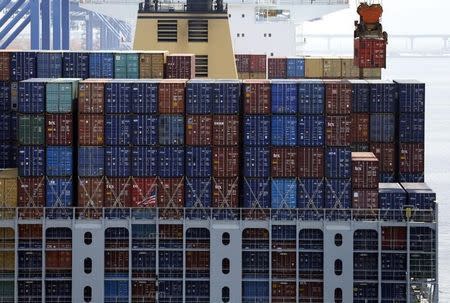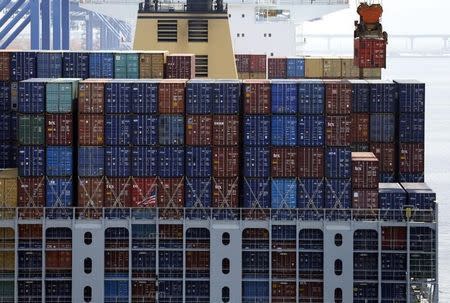South Korea Jan exports down less than forecast, but Europe hurts
By Christine Kim and Choonsik Yoo
SEOUL (Reuters) - South Korea's exports in January fell less than expected, but effects from a plunge in oil prices, a sustained slump in Europe and slowdown in China all clouded prospects for a turnaround in global demand.
Exports in January edged down 0.4 percent from a year earlier to $45.37 billion while imports dropped 11.0 percent to $39.84 billion to produce a $5.53 billion surplus, the trade ministry said on Sunday. Exports were better than forecast but imports were weaker than anticipated.
A sharp drop in demand from the European Union and weaker prices of oil and related products were mainly to blame for January's numbers, the ministry said in a statement.
Analysts said these factors would continue to drag on global trade for a while.
"Europe holds the key for South Korean exports because exports by many countries including China will eventually be influenced by demand from Europe," said Park Sang-hyun, chief economist at HI Investment & Securities in Seoul.
Shipments to the EU market tumbled 23.0 percent in January from a year earlier, the worst in three years and eclipsing a 5.3 percent rise in sales to China, which is South Korea's biggest export market.
SEVENTH-LARGEST EXPORTER
South Korea is the world's seventh-largest exporter and the first major exporting economy to report trade data. It is also home to some of the biggest global export manufacturers, such as Samsung Electronics <005930.KS> and Hyundai Motor <005380.KS>.
Analysts also played down the better-than-expected January exports, given there were more working days in South Korea this year than last year. The average export value per working day fell 6.7 percent in January both from a year earlier and from December.
The three-day Lunar New Year holiday falls either in January or February, making many South Korean economic indicators during the period subject to distortions. Last year, the holiday started at the end of January, and this year it is late February.
In addition to the slump in Europe, South Korean exports have also been hit by effects from the won's appreciation against some of the major currencies and China's push to localise production of some components.
Many analysts have said South Korea's central bank needs to deliver more interest rate cuts to keep the won from strengthening further in the aftermath of a spreading global wave of policy easing this year.
But the Bank of Korea has maintained a firm stance against calls for a further policy easing, saying Asia's fourth-largest economy would gradually regain momentum this year and that containing household debt was as important a task.
(Editing by Richard Borsuk)




